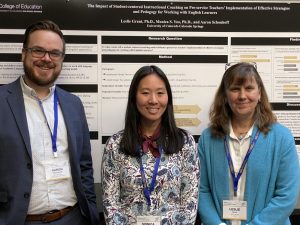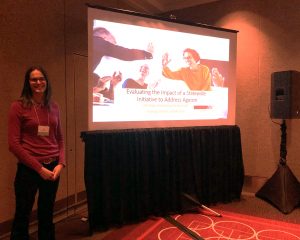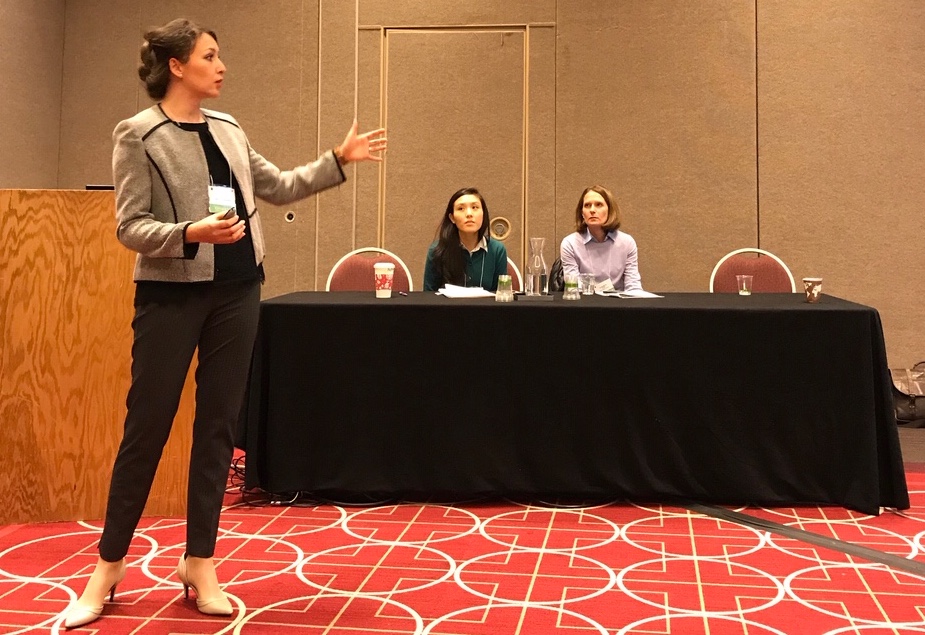Above, JVA’s Silvia Solis presents on “Incorporating the Latina voice in practice and in design: the use of cultural and language nuances to increase the effectiveness of communication efforts” at the American Evaluation Conference in Minneapolis in November.
Conference Participation Sparks Professional and Personal Growth
By Sandy Wiegand, Copyeditor and Writer at Joining Vision and Action
November was a busy but exciting month for JVA’s evaluation team, whose members got to showcase their work at conferences across the country.
Silvia gave a talk and answered questions about her work leading a bilingual market research project for JVA that sought to understand the needs of Spanish-speaking Latinas in Colorado who faced pregnancy-related depression. Clients were the Early Childhood Partnership of Adams County and the Colorado Department of Public Health and Environment. Silvia presented at the American Evaluation Association (AEA) Annual Conference, in Minneapolis.
Aaron was joined by co-presenters Professors Leslie Grant and Monica Yoo from the University of Colorado, Colorado Springs (UCCS) for a poster presentation at the Department of Education Office of English Language Acquisition National Professional Development Project Directors Meeting, in Washington, D.C.
They presented on a study at UCCS on the effectiveness of coaching student teachers in teaching English language learners.
Jill delivered two talks, also at the AEA conference. The first was on JVA’s evaluation of the Changing the Narrative initiative, which seeks to raise awareness of and adjust the language used to talk about aging and older adults. The second of Jill’s talks was on JVA’s evaluation of an intergenerational initiative by The Alliance for Strong Families and Communities in which nine nonprofits across the country brought in older-adult workers and volunteers to increase the organizations’ capacity and better serve youth.
Why attend conferences?
Sure, a trip north or east can be a nice change of pace (albeit possibly less so in November), but what else do my colleagues get out of participating in these conferences? They shared a few thoughts:

From left, JVA’s Aaron Schonhoff and UCCS professors Monica Yoo and Leslie Grant with their presentation in Washington, D.C.
To showcase the kinds of work JVA and our clients are doing:
For example, Aaron highlights one notable aspect of the UCCS study: “Our project is unique in that we have a research design that allows for a control group that we can use to compare our growth in our various measurements to.
“This allows us to draw conclusions about our data that cannot simply be chalked up to increased experience as a teacher or student teacher.”
To network with others who conduct evaluation:
Says Jill: “Not only do you get to share the cool things discovered through the work, but you also have a dialogue with colleagues across the world about challenges and lessons learned.
“So it’s the opportunity to share with others and elevate the work of our clients, but to also learn from others and identify new questions to answer or new ways of looking at things.”
Aaron, who also appreciated the face-to-face time with JVA client UCCS, was at a conference with others whose evaluation was funded by the same grant UCCS received. So, he explains: “One benefit was getting to see other grantees who are in the various stages of the same five-year grant, share what I’ve learned with them, and learn from their challenges and how they overcame them.”
For professional and personal development:
“The sessions are broken up by topic areas,” Silvia notes, “so you can find many different talks and presentations that can provide insights in what you are most interested in.”
Silvia mentions also appreciating “the opportunity to be creative and more intentional around the angle through which I presented my talk.”
“It was not just about the methods and findings themselves, per se, but the implications that the process had around the topic at hand—i.e., Latino issues,” she says.
“I was able to explore the intersection between my identity as a Latina evaluator exploring Latino issues, and this yielded findings that were relevant for the client but also for me and the process of the evaluation itself.”
Real-world impacts

Jill Iman before her Changing the Narrative presentation at the American Evaluation Association Conference in Minneapolis, in November.
So sure, evaluation speak can get a bit jargony—there’s a reason you’re not reading the conference abstracts right now. But that doesn’t mean it doesn’t point to interesting discoveries that can make a difference in the real world.
Here’s what JVA’s evaluation team had to say about the impacts of the evaluation projects they presented at their conferences last month:
Aaron: “The work we presented demonstrates that specialized one-on-one coaching is effective in helping pre-service teachers prepare themselves to work with English learners in the classroom.”
Jill: For Changing the Narrative, “The whole initiative is designed to make Colorado a more age-friendly place.”
“It highlights the power that language has in influencing environments and experiences.”
“As the population of older adults grows,” she added, “we need to all be mindful of how an age-friendly community can positively impact the lives of everyone.”
For the Alliance for Strong Families and Communities project, Jill said: “We learned really valuable lessons about how nonprofits can deliberately incorporate older adults into their workplaces to help them fulfill their missions.
“Despite evaluating the work across different organizations (e.g., size, focus, culture, geography) doing different things, we were able to identify some really instrumental factors for replication and sustainability of similar efforts.”
Bridging evaluation and empathy
Finally, reflecting on the more personal aspects of her experience, Silvia noted that having been a pregnant Spanish-speaking Mexican-American when she conducted her research, she “could very easily relate to the cultural aspects of many of these women’s struggles.”
“It was at times a really difficult process,” she notes.
“I had to be honest with myself, the client and my work to stay close with the data and represent findings that were representative, and stay objective and professional, while also acknowledging and leveraging the human side of my experience to really connect with the individuals I was speaking with and provide the warmth, receptiveness and empathy that could be helpful for them in that moment.”
Silvia recognizes that her role as a qualitative researcher in the nonprofit sector, often working with underrepresented or vulnerable populations, allows her to access “very sensitive information that leaves people feeling vulnerable.”
Thus, she says, “I make it my responsibility to be responsive and empathic and to recognize that any kinds of interactions I encounter through my job are connections that can open doors for real listening and understanding. Everyone, including me, wants to feel heard and seen. If my work can serve as an example of ways to bring real voices to the forefront of issues that many times are faceless, I consider that a real-world consequence.”







Leave A Comment